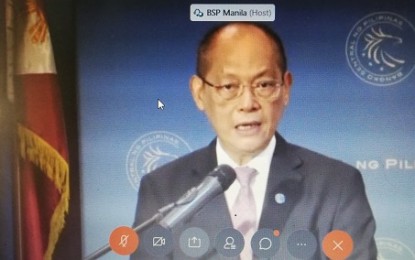
BSP Governor Benjamin Diokno
MANILA – About 88 rural banks have availed of the relief measures that are considered as alternative compliance to the reserve requirement rule by extending loans to micro, small and medium enterprises (MSMEs).
Citing latest central bank data, Bangko Sentral ng Pilipinas (BSP) Governor Benjamin Diokno said rural banks have extended about PHP44.2 billion worth of loans to MSMEs for reserve requirement compliance.
He said this amount is bigger than the PHP9.9 billion extended by 55 banks immediately after BSP issued Circular 1087 last May 27, 2020, which took effect two days later.
The circular stipulated that banks are required to deposit with the BSP certain level of their reserves.
“The use of MSME loans as allowable alternative compliance with the reserve requirement shall be available to banks from 24 April 2020 to 30 December 2021,” it said.
Diokno, however, said there is limited take-up on loans to qualified large enterprises as an alternative mode for reserve requirement compliance.
This measure is part of the central bank’s program to support the MSME sector from the impact of the coronavirus disease 2019 (Covid-19) and the resulting economic consequences due to lockdown, among others.
However, with the unprecedented impact of the pandemic, the central bank’s policy-making Monetary Board (MB) allowed MSME loans granted on or before March 15, 2020 or restructured after March 15 to be considered as alternative reserve requirements.
Banks will be allowed to avail of this relief if “the bank demonstrates an increase in its MSME loan portfolio during the month preceding the reserve day”.
Meanwhile, Diokno said they have instituted a four-phase Covid-19 exit strategy to be used under the “new normal”.
Phase 1 covers the measures implemented to ease liquidity constraints, restore business confidence, sustain credit flows, and reduce interest rates during the declaration of public health emergencies.
Phase 2 entails the institution of fiscal and monetary stimulus packages along with regulatory and operational forbearance while a community quarantine is in place.
Diokno said the government is currently implementing measures under the second phase of exit strategy
Under Phase 3, the government will allow the full operation of all sectors provided that there is already a cure for Covid-19.
The last phase is a stage wherein the economy has returned to pre-pandemic activities and more structural reforms can be undertaken.
Diokno said the liquidity support and regulatory relief measures are continuously being reviewed amid the needs of the economy and the financial sector.
“Nevertheless, while monetary and fiscal measures have been carried out, there is still room for additional monetary and fiscal support,” he added. (PNA)
